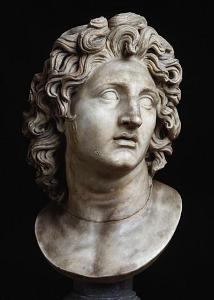Both Lay Claim to Alexander the Great
By Craig Whitlock
Washington Post Foreign Service
Tuesday, July 28, 2009
SKOPJE, Macedonia — Alexander the Great died more than 2,300 years ago. But his cult of personality is just starting to grip this tiny Balkan country.
To the annoyance of next-door Greece, which has long claimed the conqueror as its own, Macedonia has anointed Alexander its national hero. The government has renamed the international airport here in his honor, as well as the main highway to Greece. Soon to come: a 72-foot-tall marble colossus of Alexander astride his favorite warhorse, Bucephalus, which will dominate the skyline of the capital, Skopje.
The mania over Alexander is the latest chapter in a long-running feud between Macedonia and Greece that some officials fear has the potential to destabilize a region still trying to recover from the Balkan wars of the 1990s.
The dispute centers on a basic question: Does Macedonia, a country born out of the rubble of the former Yugoslavia, have the right to call itself what it wants? For 18 years, the conflict has defied attempts by the United States, the United Nations and European powers to find a solution.
The Greek government refuses to recognize its neighbor's constitutional name, the Republic of Macedonia, which it sees as a thinly veiled bid to lay claim to three of its northern districts, a region known as Greek Macedonia. After Macedonia declared independence in 1991, Greece prevented it from joining the United Nations and imposed an economic blockade that nearly strangled the fledgling country.
Greece also vetoed Macedonia's bid to join NATO last year and is blocking its admission to the European Union until it changes its name to the Republic of Skopje, the Slavic Republic of Macedonia or something similar.
Macedonian officials said they cannot understand why Greece sees their country's name as a threat or thinks they have a secret plan to annex northern Greece.
"It's laughable," said Foreign Minister Antonio Milososki, noting that the Macedonian military consists of 8,000 troops and a fleet of eight helicopters. "In America, you have a good phrase to describe a confusing situation. You say, 'It's all Greek to me.' Sometimes we say it's all Greek to us as well."
Greeks complain that the Republic of Macedonia is challenging their national identity and stealing their history. Alexander, the ruler of the ancient kingdom of Macedonia, was born in the city of Pella, located in present-day Greece. The Athens government says there is no question that he was Greek. The Republic of Macedonia, it says, consists of Slavs and other outsiders who invaded the region a millennium after Alexander died.
"This practice is bothering Greece a lot," said Greek Deputy Foreign Minister Yannis Valinakis. "It demonstrates Skopje's lack of goodwill and respect."
Under a truce brokered in 1995 by former U.S. secretary of state Cyrus Vance, Macedonia was allowed to join the United Nations on the Greek condition that it refer to itself in multinational institutions as the Former Yugoslav Republic of Macedonia, or FYROM. It was also required to change its flag and rewrite its constitution to include a promise never to violate Greek territory or interfere in Greece's internal affairs.
Macedonians hate the FYROM label, which is a reminder of communist times. Although the government has persuaded more than 120 countries, including the United States, to recognize it as the Republic of Macedonia, it is still forced to go by FYROM at the United Nations.
Officials in Skopje said that they were willing to swallow FYROM again as the price of admission to NATO last year but that Greece refused. Matthew Nimetz, the U.N.'s special envoy for the dispute, said recently he was optimistic a compromise could be reached but gave no details.
Leaders in Macedonia, a poor, landlocked country about the size of New Hampshire, warned they may have trouble holding the nation together if Greece does not relent soon. Internal unrest, they said, could easily spread to other fragile nations in the Balkans, such as neighboring Kosovo, where 1,500 U.S. troops serve as part of a peacekeeping force.
"The problem is threatening the fabric of our society," Gjorge Ivanov, the president of Macedonia, said in an interview. "The pressure that Greece is making is destabilizing the whole region."
In the Balkans, it doesn't take much for conflicts to spin out of control. Macedonia almost descended into civil war in 2001 because of fighting between ethnic Albanians, who are Muslim and constitute a quarter of the population, and ethnic Macedonians, who are Orthodox Christian.
Since then, the two groups have shared power under a peace agreement based on the assumption that Macedonia would join NATO. Both sides see the military alliance as a guarantee of internal stability. "It would give us medicine for our hot heads," said Menduh Tachi, leader of the opposition Democratic Party of Albanians.
But Tachi said the pact could be derailed if the dispute over the country's name persists much longer. "I don't even want to think of what would happen if we can't resolve it and join NATO," he said. "It would be a Frankenstein scenario."
Macedonians say the name of the country is crucial to developing their still wobbly national identity. Ethnic Albanians say they would revolt if the Slavic Republic of Macedonia was the new name because they are not Slavs. Almost nobody wants another Greek-preferred version, the Republic of Skopje, which ignores everyone outside the capital.
Historically, territory inhabited by ethnic Macedonians has belonged to other nations: Greece, Bulgaria and Serbia. Those countries have been reluctant to recognize ethnic Macedonians as a separate people, to recognize their Slavic language as a distinct tongue or even to recognize the Macedonian Orthodox Church.
Todor Petrov, president of the World Macedonian Congress, a group founded by Macedonian exiles in 1899, said the country should stop kowtowing to Greece and just call itself the Republic of Macedonia, regardless of how badly it wants to join NATO or the European Union.
In an interview, he accused Greece of "practicing ethnic cleansing and genocide on the Macedonian nation" for the past 100 years. "They're denying our nationality and culture and church and history and our borders," he said.
It is not just Macedonia's national identity that is at stake. The Greek government does not recognize ethnic minorities within its own borders, including Macedonian-speaking residents of northern Greece.
Pavle Voskopoulos, a Greek citizen who leads the Rainbow Party, a group of ethnic Macedonians in northern Greece, said the country subscribes to a myth of a "pure" Greek people who are directly descended from Alexander and others from his era. "This is all about modern Greek identity," he said. "If there is a Macedonia as an independent state, this is a great threat against Greek policy and Greek ideology."
Lacking the clout to force Greece to budge, Macedonia has intensified its glorification of Alexander and other ancient heroes, a campaign that critics in Skopje deride as "antiquization."
The country has renamed its national stadium for King Philip II, Alexander's father, and organized dozens of archaeological digs. Officials also like to needle Greeks that the philosopher Aristotle, who tutored the teenage Alexander, was from the kingdom of Macedonia, not Athens.
Pasko Kuzman, the government's director of cultural heritage, is a driving force behind Macedonia's surge of interest in the past. With flowing white hair, three heavy-duty watches strapped to his thick wrists and a National Geographic fanny pack, he has been described as a cross between Indiana Jones and Santa Claus.
In an interview in his office, sitting next to a wall-size copy of a 13th-century icon of Alexander, Kuzman insisted that Greece had stolen the conqueror's legacy from Macedonia, not the other way around.
"The Greeks are sorry that they are called Greece and not Macedonia," he said. "What else can I tell you?"
Η ΜΟΝΑΔΙΚΗ ΕΠΙΛΟΓΗ ΜΑΣ ΕΙΝΑΙ:
Η ΣΥΝΕΧΗΣ ΕΓΡΗΓΟΡΣΗ. Η ΑΦΥΠΝΙΣΗ. Η ΣΥΝΕΝΝΟΗΣΗ.Η ΕΠΙΚΟΙΝΩΝΙΑ.Ο ΣΧΕΔΙΑΣΜΟΣ.Η ΚΙΝΗΤΟΠΟΙΗΣΗ ΤΩΝ ΠΟΛΙΤΩΝ. Η ΣΥΝΕΡΓΑΣΙΑ. ΚΑΙ ΟΙ ΑΠΑΝΤΗΣΕΙΣ!

















